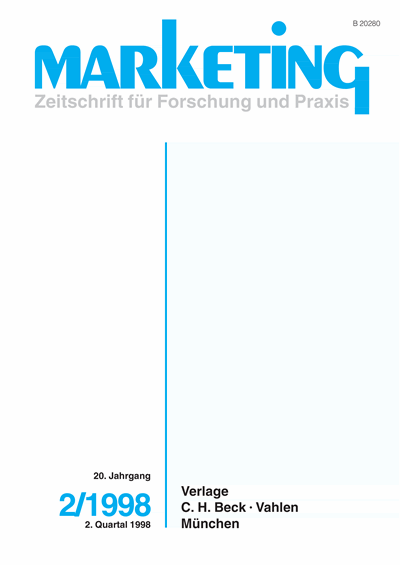Marketing ZFP
Zusammenfassung
Marketing ZFP is a platform for the academic dialog between marketing science and marketing practice. It offers critical depictions of the newest developments in the central areas of marketing science and marketing practice. Thereby, Marketing ZFP dedicates itself particularly to the transfer of methodological knowledge into practice.
Articles published in Marketing ZFP are peer-reviewed and written in either German or English. English abstracts are available for all articles.
The scientific quality of Marketing ZFP has been ranked highly: In the VHB-JOURQUAL Ranking of the German Association for Business Research, the journal is listed among the top five German journals in business research. In GeMark, the German Marketing-Journal Ranking, it is listed in category B.
For more information for authors and subscribers, see www.marketing-zfp.de.
Abstract
Marketing ZFP is a platform for the academic dialog between marketing science and marketing practice. It offers critical depictions of the newest developments in the central areas of marketing science and marketing practice. Thereby, Marketing ZFP dedicates itself particularly to the transfer of methodological knowledge into practice.
Articles published in Marketing ZFP are peer-reviewed and written in either German or English. English abstracts are available for all articles.
The scientific quality of Marketing ZFP has been ranked highly: In the VHB-JOURQUAL Ranking of the German Association for Business Research, the journal is listed among the top five German journals in business research. In GeMark, the German Marketing-Journal Ranking, it is listed in category B.
For more information for authors and subscribers, see www.marketing-zfp.de.
- Kapitel Ausklappen | EinklappenSeiten
- 69–70 Titelei/Inhaltsverzeichnis 69–70
- 71–72 Editorial 71–72
- 73–108 Abhandlungen 73–108
- 73–90 Wirkungen integrierter Kommunikation. Teil l : Theoretische Grundlagen. 73–90
- 91–97 Kontrollgruppeneinflüsse im Direktmarketing. Auswirkungen auf Werbewirkungsmessungund Kundensegmentation. 91–97
- 98–108 Kundenbezogene Wirtschaftlichkeitsanalyse des Qualitätsmanagements für Dienstleistungen. Konzept, Modellrechnung und Fallbeispiel 98–108
- 109–118 Kontaktstudium 109–118
- Zur Behandlung fehlender Daten in der Marktforschungspraxis.
- 119–132 Forum 119–132
- Limit Conjoint-Analyse.
- 133–140 Literatur 133–140
- Zeitschriftenauswertung
- 141–146 Marketing-Notizen 141–146
- Tagungsberichte


